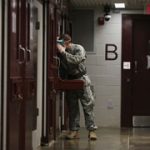When the American Psychological Association (APA) Council of Representatives voted Friday morning to rescind its policy allowing psychologists to participate in the interrogation of security detainees, it was a tectonic shift. For more than a decade, the APA had worked hand in glove with the Department of Defense (DoD) and other U.S. government entities to enable psychologists to participate in “enhanced interrogations,” or torture and ill-treatment, of these detainees.
It would be difficult to overstate how important the APA’s support was to the Bush administration’s claim that it was acting within the law. The claim was that these “enhanced interrogation techniques” were safe, effective, and therefore legal. In short, psychologists gave cover to the lawyers arguing for this unlawful practice.
But psychologists should never have been involved in trying to redefine torture, or the deliberate infliction of severe pain and suffering for a specific reason, such as obtaining information from a detainee. Psychologists, better than most people, knew that trying to destroy someone’s sense of self, identity, autonomy, and control is not only illegal because it causes such severe pain and suffering, but is also unethical.
Like other health professionals, psychologists are bound by ethics to use their knowledge and skills to “do no harm.” This important principle exists because people turn to health professionals when they are in need, and abusing the power to treat would be devastating not just for the patient, but also for trust in the health field more broadly. The infamous Tuskegee experiment, in which black men were denied treatment for syphilis so that doctors could see how the disease progressed until it killed them, still haunts the medical profession in the United States. It also may well haunt black men who wonder if they can trust their doctors to see them as patients, not lab rats.
The 780 men and boys who were held at the detention center at Guantánamo Bay and countless others held in Bagram air base in Afghanistan, Abu Ghraib in Iraq, and still undisclosed black sites were at risk of torture and cruel, inhuman, and degrading treatment or punishment by those who took an oath to heal them. Many of the detainees who have since been cleared and released are still suffering and some may never recover.
To compound the suffering, the U.S. government has effectively denied all these detainees access to the courts to seek justice for these egregious human rights violations. They cannot make claims regarding their unlawful detention, transfers from different countries, denial of access to lawyers, or communication with their families. This is one of the reasons the APA’s vote reflects a dramatic change in attitudes – moving from denial, specious justification, and excuses to beginning to correct the wrongs and acknowledge the harms, many of which came to light in a recently released independent report commissioned by the APA. As the organization takes steps to come to terms with its collusion in illegal and deeply harmful practices, more information about those practices will be exposed.
It is fitting that health professionals are the first group of people to take responsibility for the myriad violations in the context of the U.S. government’s counter-terrorism policies. Psychologists and the APA have begun to heal themselves and in so doing may well have opened doors for those who have been harmed to seek justice.
Our work is far from over. Secrecy remains the government’s key tool for covering up the extent of its unlawful behavior. But as people of conscience step forward to say “not in my name,” the secrecy will erode and the path to accountability for the perpetrators and justice for the victims can begin.

